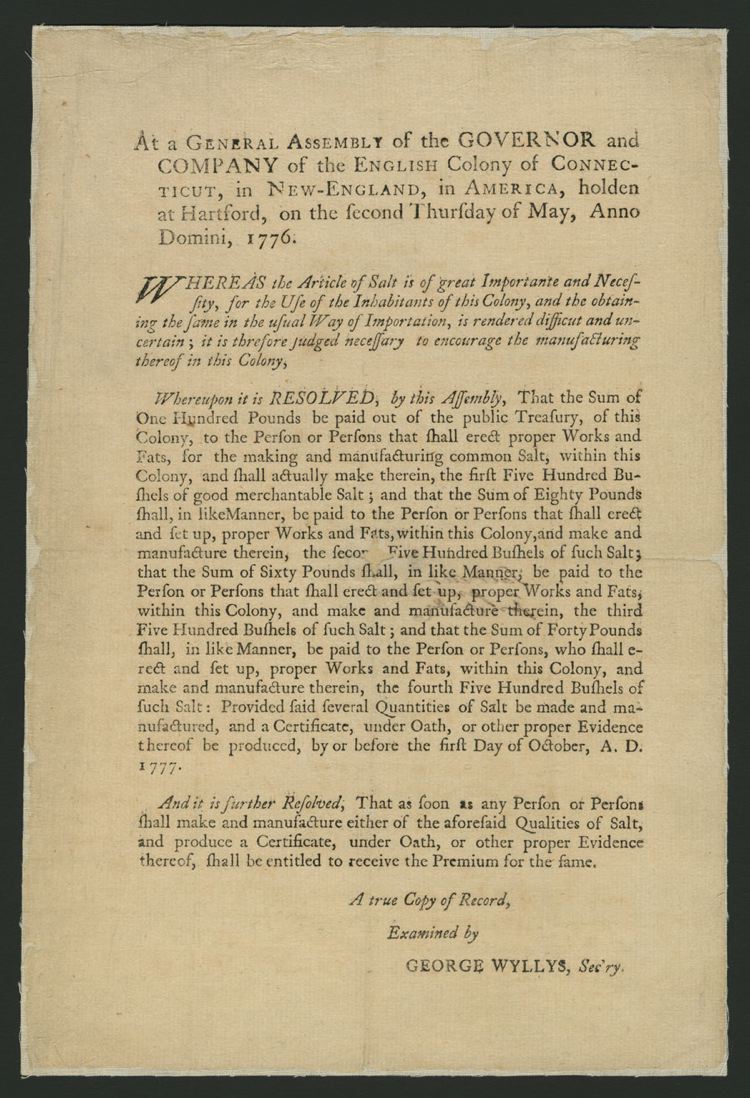Lesson Plan Three: Work (Page 2)
Responding to the Stamp Act of 1765
In this activity students will assume their created identity and respond to the Stamp Act of 1765. Students will decide whether or not this act impacts the daily lives of their colonist and what actions to take in response to the act.
Student Instructions
Now that you have created a colonial identity you are ready to start looking at the American Revolution through the eyes of a colonist!
It is 1765 and the British Government has just passed the Stamp Act. This act was passed by the British Government due to debt incurred during the French and Indian War and the Seven Years War.
The Stamp Act requires that all legal documents and some other paper materials in the American colonies be embossed with a British stamp. This means that anyone wishing to acquire one of these documents would need to pay a tax for the stamp!
What do you think about the Stamp Act?
Does this have an impact on your life as an American Colonist?
Follow the steps below to examine the Stamp Act in more detail and respond to the British government!
Step 1: Read the Stamp Act of 1765
Working individually, read the Stamp Act, fill out the Written Document Analysis form and answer questions relating to the document.
Step 2: Discuss your colonist's opinion
Armed with your Document Analysis Worksheet and your answers to the questions, report back to your group about how you think your colonist would respond to the Stamp Act.
Step 3: Write a Letter to the British Government
Compose a letter to King George II on your colonists response to the Stamp Act.
The Stamp Act, 1765
WHEREAS by an act made in the last session of parliament, several duties were granted, continued, and appropriated, towards defraying the expences of defending, protecting, and securing, the British colonies and plantations in America: and whereas it is just and necessary, that provision be made for raising a further revenue within your Majesty's dominions in America, towards defraying the said expences: we, your Majesty’s most dutiful and loyal subjects, the commons of Great Britain in parliament assembled, have therefore resolved to give and grant unto your Majesty the several rates and duties herein after mentioned; and do most humbly beseech your Majesty that it may be enacted, and be it enacted by the King’s most excellent majesty, by and with the advice and consent of the lords spiritual and temporal, and commons, in this present parliament assembled, and by the authority of the same, That from and after the first day of November, one thousand seven hundred and sixty five, there shall be raised, levied, collected, and paid unto his Majesty, his heirs, and successors, throughout the colonies and plantations in America which now are, or hereafter may be, under the dominion of his Majesty, his heirs and successors,
Examples of items requiring a stamp:
For every skin or piece of vellum or parchment, or sheet or piece of paper, on which shall be ingrossed, written or printed, any declaration, plea, replication, rejoinder, demurrer, or other pleading, or any copy thereof, in any court of law within the British colonies and plantations in America, a stamp duty of three pence.
For every skin or piece of vellum or parchment, or sheet or piece of paper, on which shall be ingrossed, written, or printed, any bond for securing the payment of any sum of money above twenty pounds, and not exceeding forty pounds of sterling money, within such colonies, plantations, and islands, a stamp duty of one shilling and six pence.
For every skin or piece of vellum or parchment, or sheet or piece of paper, on which shall be ingrossed, written, or printed, any copy of any will (other than the probate thereof) monition, libel, answer, allegation, inventory, or renunciation in ecclesiastical matters in any such court, a stamp duty of six pence
For every pack of such cards, the sum of one shilling.
And for every pair of such dice, the sum of ten shillings.
For every pamphlet and paper being larger than one whole sheet, and not exceeding six sheets in octavo, or in a lesser page, or not exceeding twelve sheets in quarto, or twenty sheets in folio, which shall be so printed, a duty after the rate of one shilling for every sheet of any kind of paper which shall be contained in one printed copy thereof.
For every advertisement to be contained in any gazette, news paper, or other paper, or any pamphlet which shall be so printed, a duty of two shillings.
And for every almanack or calendar written or printed within the said colonies and plantations, to serve for several years, duties to the same amount respectively shall be paid for every such year.
Accessed from the Avalon Project, June 3, 2006, http://www.yale.edu/lawweb/avalon/amerrev/parliament/stamp_act_1765.htm
Make a list of papers that require a British stamp after the Stamp Act of 1765 was enacted.
Which of these do you think would effect the daily life of your colonist?
Based on your reading of the Stamp Act and the research done on your colonist's job, do you think your colonist would support the Stamp Act of 1765? why or why not?
Letter Template: Respond to the British Government
Use the form below to draft a letter to King George III from your colonist in response to the Stamp Act of 1765. Make sure to include the following:
Do you support the Stamp Act? why or why not?
What will you do in response to the Stamp Act?
Do you support British rule in the colonise?
| Dear King George III, |
Activity Three: The Revolution and the American Economy
In this activity students will read primary documents that offer clues on the impact of the Revolution on the American economy. Students will evaluate whether or not the state of war and the separation of the United States economy from Great Britain had an impact on the individual colonists created in Activity 1.
Download Document Analysis Worksheet (PDF)
Student Instructions
Colonial anger over British rule sparked by actions such as the Stamp Act of 1765 has resulted in war! In April of 1775 the first shots were fired at Lexington and Concord and on July 4, 1776 the American colonies declared their independence from Great Britain.
It is now 1777 and the war rages on. It has changed the nature of the former colonies now united as the United States of America. In this activity, your job is to examine primary documents that will give you insight into how these changes have impacted the American economy and the job of your colonist.
Follow the steps below to complete this activity and determine the impact of the American Revolution on the work performed by your colonist!
Step 1: Examine Primary Source Documents
In your groups assign each student one of the below primary documents to read and analyze
Student 1: Request for colonists to produce salt
Student 2: Receipts for the purchase of war materials
Student 3: Proclamation of Lord Dunmore
Student 4: Excerpt from the Boston Gazette April 7, 1777
While reading keep in mind the following essential question:
How has the American Revolution impacted the economy?Step 2: Group Discussion
Armed with your Document Analysis Worksheets and answers to the above question report back to your group on any clues you found on how the war has impacted the economy. As a group, discuss what this means for your colonist. As a group, discuss an answer to the following questions:
Has the American Revolution impacted the work performed by your colonist? why or why not?
Step 3: Your Colonist Before and After the war
As a group, use the information from Activities 1, 2 and 3 to fill out the following Venn Diagram to compare the life if your colonist before and during the war. How has the war changed the kind of work done by your colonist?.
Request for the Production of Salt
Receipts for the purchase of war materials
Examine the following receipts for the purchase of materials for use in the war. Answer the questions that follow each primary source document.
While reading this documents consider the answer to the following question:
What does this document say about the American economy during the American Revolution?
 -->
-->
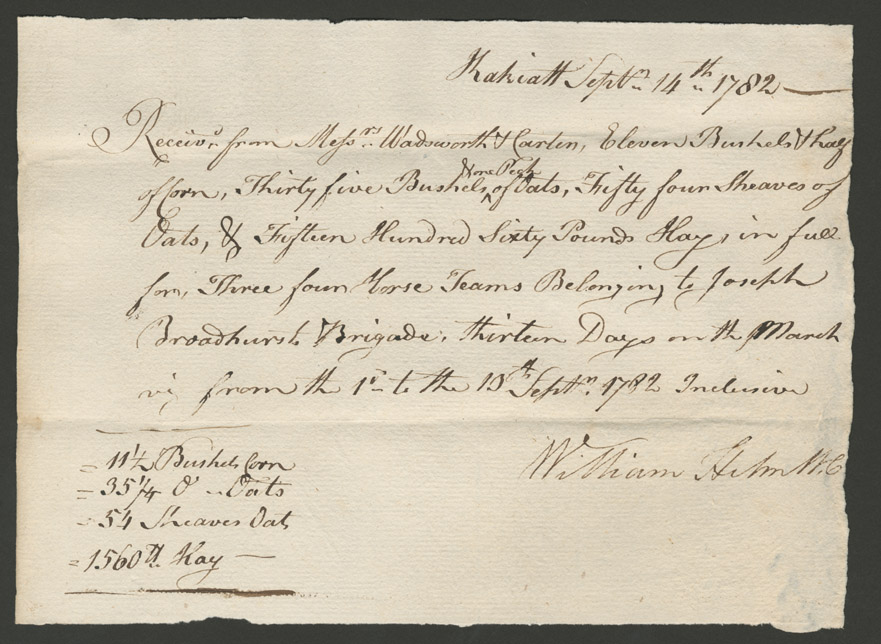
This resource is in the Maass archive
Questions:
- What items are listed on this receipt?
- Where do you think these goods are produced?
- Who might benefit from the purchase of these materials?
 -->
-->
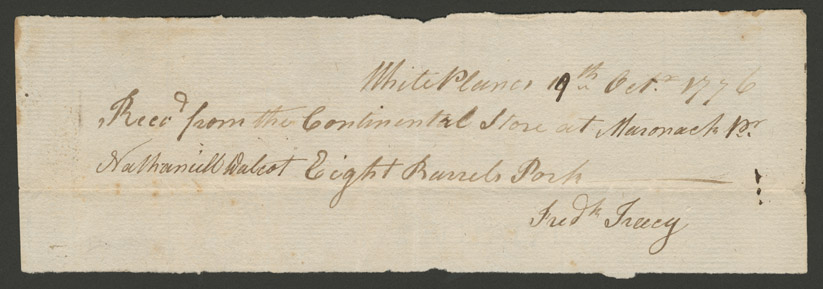
This resource is in the Maass archive
Questions:
- What goods are listed on this receipt?
- What industries participate in the production of these goods? be creative! how many different industries can you think of?
- How do you think these types of purchases might have impacted the overall economy?
 -->
-->
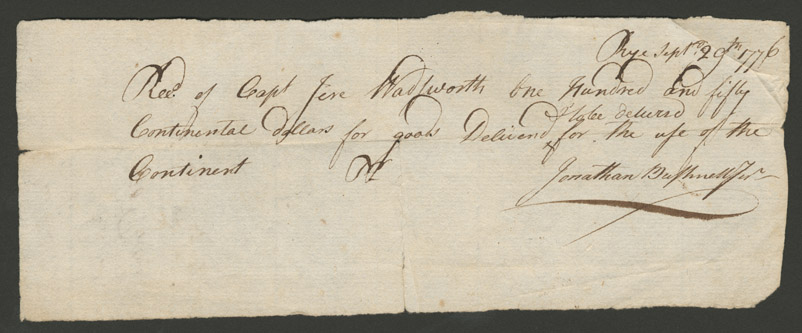
This resource is in the Maass archive
Questions:
- How much did the goods listed on this receipt cost?
- What currency was used to pay for these goods?
- Why do you think it is important that the United States began printing the Contintental Dollar during the Revolution?
Lord Dumore's Proclamation
Read the following proclamation issued by John Murray, Earl of Dunmore and the royal Governor of Virginia and fill out the Written Document Analysis Worksheet.
While reading this document consider the answer to the following question:
What impact might this have had on the American economy?
By His Excellency the Right Honorable JOHN Earl of DUNMORE, His MAJESTY'S Lieutenant and Governor General of the Colony and Dominion of VIRGINIA, and Vice Admiral of the fame.
A PROCLAMATION.
As I have ever entertained Hopes that an Accommodation might have taken Place between GREAT-BRITAIN and this colony, without being compelled by my Duty to this moft difagreeable but now abfolutely neceffary Step, rendered fo by a Body of armed Men unlawfully affembled, bring on His MAJESTY'S [Tenders], and the formation of an Army, and that Army now on their March to attack His MAJESTY'S troops and deftroy the well difpofed Subjects of this Colony. To defeat fuch unreafonable Purpofes, and that all fuch Traitors, and their Abetters, may be brought to Juftice, and that the Peace, and good Order of this Colony may be again reftored, which the ordinary Courfe of the Civil Law is unable to effect; I have thought fit to iffue this my Proclamation, hereby declaring, that until the aforefaid good Purpofes can be obtained, I do in Virtue of the Power and Authority to ME given, by His MAJESTY, determine to execute Martial Law, and caufe the fame to be executed throughout this Colony: and to the end that Peace and good Order may the fooner be [effected], I do require every Person capable of bearing Arms, to [refort] to His MAJESTY'S STANDARD, or be looked upon as Traitors to His MAJESTY'S Crown and Government, and thereby become liable to the Penalty the Law inflicts upon fuch Offences; fuch as forfeiture of Life, confifcation of Lands, &c. &c. And I do hereby further declare all indentured Servants, Negroes, or others, (appertaining to Rebels,) free that are able and willing to bear Arms, they joining His MAJESTY'S Troops as foon as may be, for the more fpeedily reducing this Colony to a proper Senfe of their Duty, to His MAJESTY'S Leige Subjects, to retain their [Qui?rents], or any other Taxes due or that may become due, in their own Cuftody, till fuch Time as Peace may be again reftored to this at prefent moft unhappy Country, or demanded of them for their former falutary Purpofes, by Officers properly authorifed to receive the fame.
GIVEN under my Hand on board the ship WILLIAM, off NORPOLE, the 7th Day of NOVEMBER, in the SIXTEENTH Year of His MAJESTY'S Reign.
DUNMORE.
(GOD fave the KING.)
University of Virginia
Lord Dunmore's Proclamation from PBS, accessed June 5, 2006 at:
Boston Gazette
Look over the following page from The Boston Gazette, April 7, 1777 and fill out the Written Document Analysis Worksheet.
While examining this document consider the answer to the following question:
What clues can you find about the American economy in this newspaper?
 -->
-->
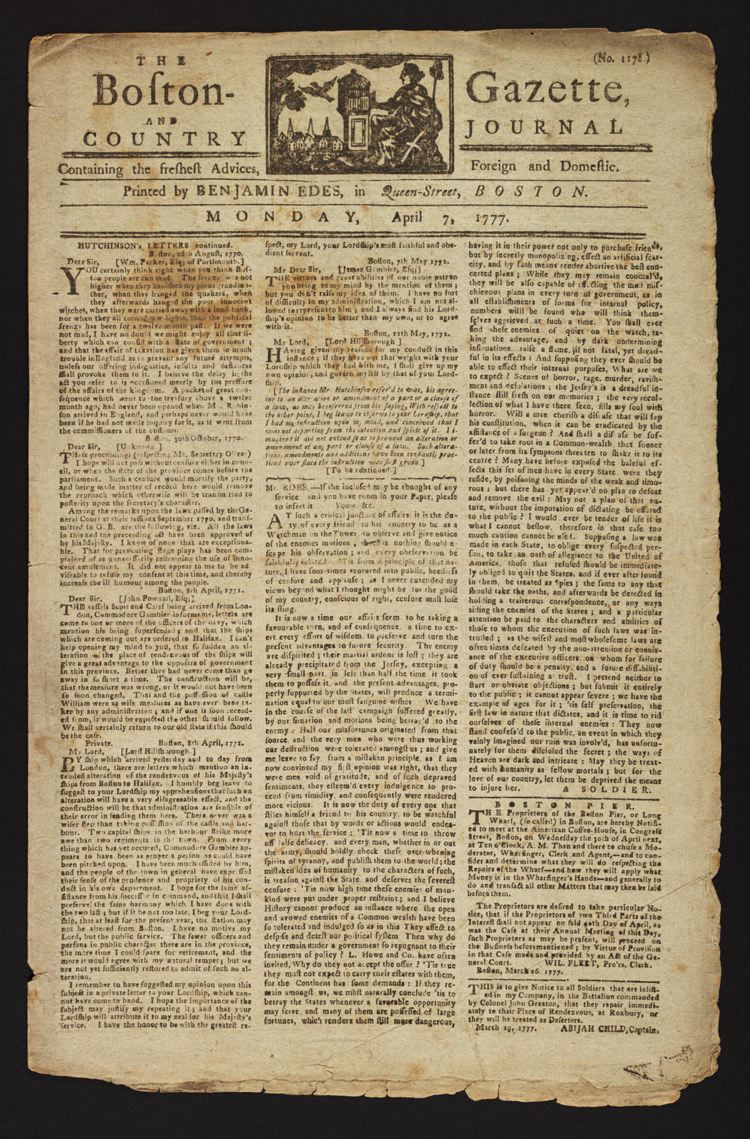
Venn Diagram
 -->
-->

« Return to Index

 -->
-->
